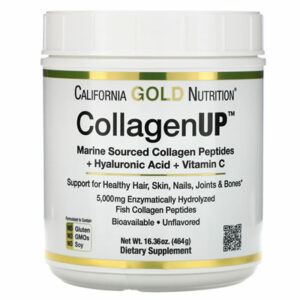Collagen is the most abundant structural protein in animals (formed by a variety of amino acids, and the word Collagen is derived from the Greek word kólla, meaning glue). In humans, collagen occupies one-third of the total protein mass and three-quarters in the skin structure. It is the most important substance in the extracellular matrix and connective tissue (such as cartilage, hard bone, blood vessels, cornea).
Do you know collagen benefits and side effects?
There are about 16 kinds of collagen in the body (but 80-90% are composed of the first, second, and third types) and form different structures, but they all have the same purpose, which is to maintain the strength and toughness of the tissue. And can not withstand the stretching of external forces.
In addition to endowing the skin with toughness, elasticity, and water resistance, collagen is also important component in ligaments, tendons, and joints. If it is lacking or insufficiently manufactured, it will cause various functional degradations.
The body’s ability to make collagen will be affected by age and lifestyle. When you grow older or have poor habits, your body’s collagen will gradually be lost, and various external and internal changes will occur.
Table of Contents
- Is oral collagen really ineffective?
- What are the benefits of collagen?
- Are there any side effects of collagen?
- When does collagen (how to eat) have the highest absorption rate?
- What are the necessary nutrients to help collagen production?
- Where can I buy the most used collagen products?
Is oral collagen really ineffective?
Is oral collagen effective? It is an old issue that has been debated for decades. The main reason is that collagen, like meat food, will be broken down into amino acids after entering the body, and then synthesized into protein by absorption.
But don’t forget that although technology is changing with each passing day, there are still many phenomena that science can’t fully explain. Just as a news mentioned, young children have precocious puberty after eating excessive amounts of the chicken testis, chicken skin, and other foods that have hormonal residues. phenomenon.
It stands to reason that the hormones in these foods are also a type of protein. After entering the human body, they will be metabolized into amino acids and then reconstituted into proteins, because there will be no hormonal effect, but in fact, the effect is obvious.
Therefore, the consumption of collagen products should still have a certain effectiveness. It is only consumers who choose products carefully before buying, and not to be over-enthusiastic. Nutritional balance, more exercise, fewer sweets, junk food, and a healthy mind are the only ways to maintain youth. Two methods.
What are the benefits of collagen?
1. Beneficial skin aging phenomenon
Skin aging is a complex physiological process that combines various internal and external factors (gene, cell metabolism, hormones, metabolism, light exposure, pollution, chemical toxins, free radiation, etc.).
From a practical perspective, aging can be said to start from birth, and the accumulation of bit by bit slowly leaves traces of years on the skin.
At a certain age, in addition to wanting to live longer, maintaining a young appearance is also one of the important goals, which has caused the prosperity of the beauty industry.
A double-blind controlled study (an 8-week study involving 69 women) found that oral hydrolyzed collagen hydrolysate helped improve skin elasticity, skin water retention, and water evaporation rate (but these two were not statistically significant).
Other double-blind controlled studies (for 8 weeks, targeting 85 Chinese women) also pointed out that compared to placebo, hydrolyzed collagen does help improve skin aging conditions, such as skin moisture, elasticity, wrinkles, and roughness.
The author points out that the hydrolyzed collagen products containing more prolyl-hydroxyproline (Pro-Hyp) and glycine (hydroxypropyl-glycine, Hyp-Gly) dipeptide molecules have improved the most.
*Conclusion: Oral collagen may have the effect of increasing skin water retention, elasticity and wrinkle improvement, but more large-scale studies are still needed to further confirm
2. Beneficial for osteoporosis
Osteoporosis is a major threat to the health of elderly people. It is estimated that 10 million people are affected in the United States alone, and related medical expenses exceed 10 billion US dollars. By 2020, more than half of people over the age of 50 will be at risk of fracture.
Bone is a kind of active and dynamic connective tissue, mainly composed of organic proteins: type I collagen, fibronectin, osteonectin, osteocalcin, and inorganic minerals (calcium and phosphorus), indispensable.
Among them, type I collagen is an important extracellular matrix structural protein in the process of bone formation and also plays an important role in osteoblast differentiation.
In animal studies, it has been found that appropriate intake of hydrolyzed collagen peptides can help increase bone mass and further enhance the effect of exercise on bone growth.
3. Improve cellulite
Cellulite is a local skin problem that scares beauties. Eighty-five percent of women over the age of 20 have this problem. The most common sites are thighs, buttocks and abdomen. Note 5 is mainly due to the expansion of excessive fat tissue to the dermis, blood, and lymph, which in turn interferes with or changes the extracellular matrix of the dermis, resulting in uneven skin like oranges or cheese.
Cellulite occurrence often involves multiple factors, including genes, gender differences, age, ethnicity, diet, sedentary lifestyle, and pregnancy.
A double-blind controlled study (a 6-month, 105 women with moderate cellulite) found that the ingestion of collagen peptides, in addition, to help reduce the severity of cellulite, corrugated thigh skin, dermal density, subcutaneous margin The world has also improved to varying degrees (compared to placebo).
4. Beneficial sarcopenia
Sarcopenia is related to aging, and the natural loss of skeletal muscle strength and strength begins as early as 40 years of age. After 80 years of age, more than 50% of skeletal muscles will be lost throughout the body.
Since muscles are important metabolic tissues throughout the body (50% of body mass), any significant changes can have serious health effects, increasing insulin resistance, fatigue, falls, and mortality.
A double-blind controlled study (a 12-week, 53-year-old male with sarcopenia) pointed out that the ingestion of collagen peptides and resistance training can further improve body composition, including improving muscle strength, fat-free mass, And reduce the fat mass content (compared to training with placebo).
5. Beneficial osteoarthritis
Chronic osteoarthritis is a common disease among middle-aged and elderly people. The affected parts are most commonly the knees and buttocks. The occurrence of pain usually occurs after weight-bearing limbs (including walking and standing). Other symptoms include stiffness of the affected part in the morning or a period of inactivity After starting difficulties (commonly known as gelation).
It is estimated that more than 20 million people in the United States are affected by osteoarthritis, accounting for 25% of the visit rate of all primary care physicians’ outpatient clinics, and the total medical cost reaches 60 million US dollars.
A double-blind controlled study (a 13-week period involving 30 knee osteoarthritis patients) pointed out that collagen peptides (whether derived from pigskin or bovine bone) can help improve the overall symptoms of osteoarthritis and quality of life.
The underlying mechanism is believed to be related to collagen peptides regulating chondrocyte differentiation and stimulating proteoglycan synthesis to initiate cartilage tissue repair
6. Diffuse Cutaneous Systemic Sclerosis
Systemic scleroderma is a relatively rare autoimmune disease. The main clinical symptoms include persistent microvascular vasoconstriction, swollen fingers, tight skin, finger contractures, pain in multiple joints, and difficulty swallowing.
According to the degree of skin fibrosis, it can be divided into a limited type and diffuse type. Diffuse skin thickening will appear on the upper arm, chest, abdomen, or thigh, and the internal organs are also damaged more seriously.
A double-blind controlled study found that oral type 1 collagen had no significant improvement in skin invasion assessment (MRSS) or other clinical indicators compared to placebo.
However, in the supplementary analysis, it was found that for patients with advanced diffuse skin system sclerosis, the MRSS score of the collagen group still decreased significantly, but the relevant results still need more verification.
Are there any side effects of collagen?
In most cases, collagen products are well tolerated without significant side effects. However, a small number of adverse reactions have been reported, including mild diarrhea, rash, stomach sensation, heartburn, fatigue, etc. (side effects may be related to the main component or other auxiliary components)
Precautions
Do not use it for pregnant women, breastfeeding women, or those with poor liver and kidney function (because the relevant safety is still unknown).
Do not use it if you have been allergic to eggs, meat, and seafood (may cause allergic reactions).
When does collagen (how to eat) have the highest absorption rate?
The best time for oral collagen is fasting, 1 to 2 hours after a meal or before going to bed. In this state, the digestive system can specifically decompose the protein or amino acid in it, and the absorption rate will be higher.
However, for people with weak or sensitive gastrointestinal function, drinking on an empty stomach may cause discomfort, so it can only be taken with meals to reduce the irritation, so as not to cause symptoms such as excessive stomach acid or indigestion.
And generally to experience the effect after supplementation, usually to use continuously for 2 to 4 months, if you do not feel good changes after eating for a period of time, you can stop.
What are the necessary nutrients to help collagen production?
Proline, Glycine, Glutamine, Arginine, and Vitamin C are important precursors for forming collagen eggs, which can maintain the strength, elasticity, and stability of the triple helix structure.
Therefore, before buying related products, it is best to pay attention to whether they contain these ingredients. Do not blindly follow the exaggerated advertising language, but only to understand the effective ingredients to be guaranteed.
And foods rich in these nutrients are poultry, seafood, dairy products, beans, tofu, vegetables, and fruits.
Where can I buy the most used collagen products?
In recent years, food safety problems in various countries have exploded, and it is not healthy but black-hearted products that everyone spends on. Therefore, European and American products with relatively strict quality control have become popular products.
And iHerb.com is a large-scale medical cosmetics e-commerce company in the United States. It has a high satisfaction rate of 97% in the evaluation of Google customers. It provides global home delivery so that you can buy it without risking buying fakes through purchasing high-quality health products.

